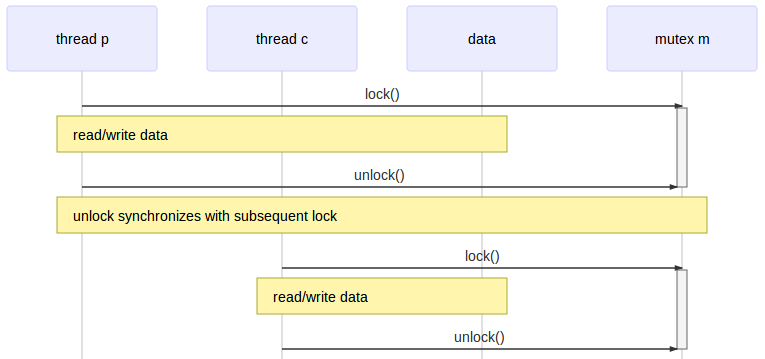C++11 synchronizes-with
A few examples involving synchronizes-with: the C++ key word for basic thread synchronization
Introduction
The C++ standard specifies that accessing the same data from multiple threads
with no appropriate synchronization leads to undefined behaviour. We’ll look
at three simple scenarios in C++ that do appropriate synchronization, exclusive
data access in particular, using std::mutex and std::thread.
Mutex locking
To exclusively access shared data using a std::mutex, each thread will
lock() the mutex, change the data then unlock() the mutex.
To ensure that unlock() is called, using a class likestd::scoped_lock
or similar is highly recommended.
From the programmer’s perspective one thread “produces” the shared data, while
another thread “consumes” the shared data. For anything other than the
simplest piece of data (e.g. a bool) usually “producing” means both reads and
writes. E.g. if the data is a queue, push_back() will read and increment the
size. The same applies to “consuming”.
In C++ standard legalese this is appropriate synchronization because the mutex
unlock() synchronizes with any subsequent lock() operations that obtain
ownership of the same mutex. This guarantees that all the reads and writes done
by a thread before unlock() are seen by reads and writes done by another
thread after lock().

Thread creation
Before we create treads we usually initialize data that will be used by the thread, including the objects used for synchronization (e.g. mutex, condition variables). The standard guarantees that all the reads and writes of this initialization are seen consistently by the function that the tread executes.
In C++ standard legalese: the completion of the invocation of the constructor synchronizes with the beginning of the invocation of thread function.

Thread completion
Similarly when completing/ending a thread the function join() is used to
confirm that the thread function completed. The standard guarantees that all
the reads and writes done by the function that the thread executes are then
seen consistently after the join() function returns.
In C++ standard legalese: the completion of the thread synchronizes with the
corresponding successful join() return.

References
- Jeff Preshing: The Synchronizes-With Relation, 23 Aug 2013